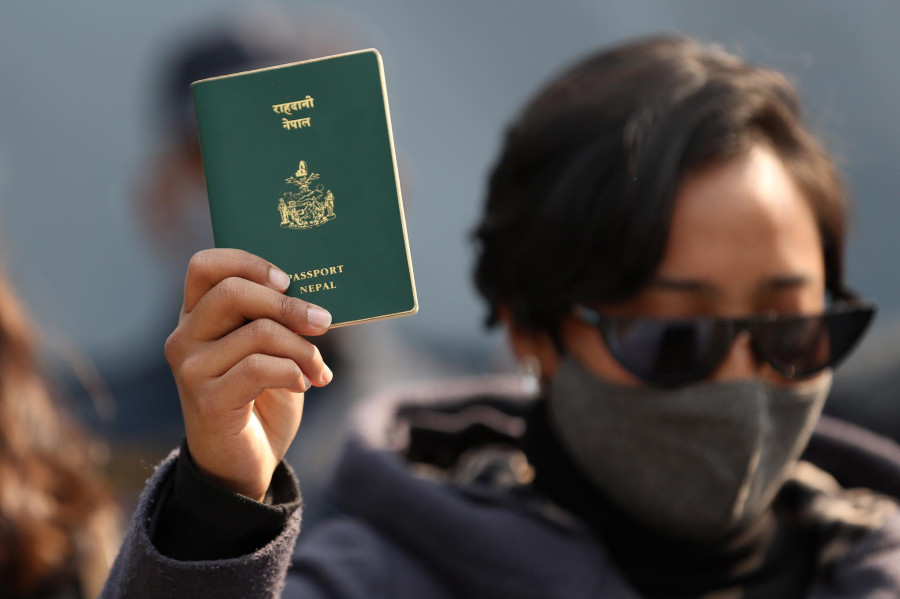National
Proposed travel rule change may not help control women’s trafficking, experts say
Immigration official tries but fails to convince protesters that the government is not trying to curtail anyone’s rights.
Chandan Kumar Mandal & Samiksha Baral
A group of youth gathered outside the office building of the Department of Immigration at Kalikasthan on Thursday afternoon, protesting against proposed changes to the immigration rules that make it difficult for women under 40 to travel abroad on visit visas on their own.
Holding their passports in their hands, the youths said they would return them to the state if they are not allowed to live with dignity. “Let us live with dignity or take back our passports,” shouted the protesters, most of them women.
Soon, the venue of the protest witnessed an informal debate between a department official and the protesters.
“If we have to seek permission from the ward office before going abroad, then we will submit our passports to the ward office and also apply for a visa from the office,” said Bhawana Raut, one of the protesters. “This rule infringes upon our fundamental rights. We will not tolerate it.”
“The new rule shows how the state sees women,” said another protester. “This is a reflection of the state’s patriarchal mindset.”
Tek Narayan Paudel, the department official witnessing the protest, was prepared to defend the government.
“We are also committed to protecting the rights of citizens. We aren’t going to introduce any rules that go against [the principles of] human rights,” Paudel told the group. “We have not made a final decision [on the issue]. Only a proposal [on the issue you are referring to] was prepared by a committee under the Home Ministry.”
Not convinced, one protester retorted, “If the new rule was not criticised massively, it would already have become law, and the general public would only know about it after it is enforced.”
The official continued to assure the group that no laws will be made to encroach upon the citizen’s fundamental rights. But the protesters weren’t convinced.
The proposed rule, if implemented, will make it mandatory for women under 40 to get consent from their family members and a recommendation from the local ward office before leaving the country on visit visas. The rule has been met with a barrage of criticism from members of the general public, women rights defenders, and lawyers, calling it ‘regressive’.
Amnesty International, Nepal on Thursday said that the new proposed rule regarding foreign travel of women under 40 is discriminatory. It called on the government to halt such arbitrary proposals.
“This policy proposal is blatantly discriminatory towards women and completely disregards their right to free movement,” said Nirajan Thapaliya, director of Amnesty International, Nepal. “In the name of ‘protecting’ its citizens, Nepali authorities must not introduce measures that violate the fundamental rights and freedom guaranteed in the Constitution to all, irrespective of their gender.”
National Network for Safe Migration, a body of organisations working in the field of migration, on Thursday, also called the rule a “twisted move” to ultimately ban women from going abroad.
Women's Rehabilitation Centre (WOREC), a non-governmental organisation working for the protection and promotion of human rights, said the new rule portrays women as the culprit and is the outcome of a gender-biased mentality, which will further strengthen structural discrimination faced by Nepali women.
However, the government has defended the proposed rule saying it is only meant to protect women from potential trafficking, other abuses or getting stranded abroad.
Following massive criticism, the Department of Immigration, in a statement, said the proposed rule would be applicable only for first-time travellers going to the Gulf and African countries where the risk of abuse is high.
The government has been defending the move to keep a check on Nepalis leaving on visit visas, which has seen a worrying surge lately, making them vulnerable to various abuses in the future.
Experts in the field of women's rights and labour migration doubt that such measures would work to address the problem, given the country’s experience.
“The rule must have been proposed with the intention of protecting its citizens,” said Sharu Joshi Shrestha, a gender and labour migration expert. “But how can such a move be effective when we have an 1,800-km-long open border with India?”
Nepal shares a 1,850 km-long porous border with five Indian states. Indian routes have often been used by traffickers for smuggling Nepali women into the Gulf and east-Asian countries.
Every time, the state comes up with rules that restrict women’s movement, it seems to backfire. Unable to fly via the country’s lone international airport, due to a series of bans in the past, women have been compelled to take unsafe land routes.
Nepali women have managed to go to war-torn and unsafe countries such as Afghanistan, Iraq, Libya, and Syria even when Nepal barred them from working and living in these countries. Nepali women have also been found to have made their way into African countries such as Kenya, where they have worked in captive-like situations. Similarly, a large number of Nepali women are working in Lebanon as housemaids despite a government ban on doing so.
Women rights activists have been saying that the state’s protectionist approach has failed to yield expected results as women have continued to go abroad through illegal routes and face abuse at the hand of traffickers.
According to the annual human trafficking report of the National Human Rights Commission for 2018-19, nearly 1.5 million Nepalis are at risk of various forms of human trafficking. The report estimated that nearly 35,000 Nepali citizens—15,000 men, 15,000 women, and 5,000 children—were trafficked during the period.
This data was compiled when the government ban on Nepali women for taking up housemaid jobs in the Gulf region was still on.
“The state’s protectionist approach has entirely failed so far. Such moves have put constraints on their right to movement and work guaranteed under the International Covenant on Civil and Political Rights (ICCPR) and CEDAW,” said Mohna Ansari, former national human rights commissioner. “Women face various forms of discrimination when it comes to issues such as wages while working at home or abroad.”
The new decision shows the state treats women as second-class citizens, the decision will only increase the incidents of sub-agents and traffickers luring women into slavery, said Ansari.
The new rule, if implemented, will once again force job-seeking women to turn to other routes to reach destination countries, experts fear.
“They will start going abroad via India. They do not have to go through the airport in Kathmandu,” said Shrestha, also an executive member at Nepal Policy, a think tank “Are there enough jobs at home to employ women? The government has fixed Rs13,450 as the minimum monthly wage, but domestic helps get around Rs4,000-Rs5,000. Is the government monitoring that? Where is the guarantee of decent jobs and a dignified working environment?”
The proposed rule, which is likely to limit the free movement of women, also comes four months after a parliamentary committee asked the government to relax the existing ban on Nepali women to work in the Persian Gulf as domestic workers. The move was welcomed.
“If the parliamentary committee had made the decision, then the government agencies should have moved ahead in implementing that particular decision,” said Shrestha. “The latest decision shows there is a lack of coordination among concerned agencies.”
After more than three years of imposing a ban on Nepali women from taking up domestic jobs in the Gulf countries, the committee had lifted the ban to allow them to work as domestic help in those countries.
“Restricting mobility has never proved to be the right strategy in curbing trafficking,” said Anurag Devkota, a human rights lawyer. “This was evident especially because the country has witnessed a surge in human trafficking cases whenever the government comes up with impractical bans.”




 13.12°C Kathmandu
13.12°C Kathmandu















